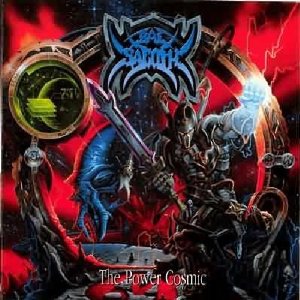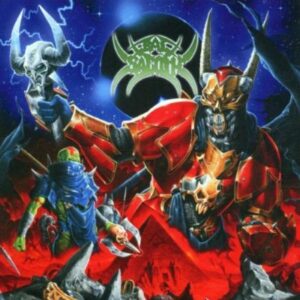Between 1999 and 2006 Bal-Sagoth, a symphonic black metal band hailing from Yorkshire, embarked upon a trilogy (actually, their second trilogy, the first having been written between 1994-1999, resulting in the band signing to Nuclear Blast) – a tale of war, Gods, space and time, that has now been re-issued by the Polish label Metal Mind productions on ultra-limited (2000 copies of each) gold CDs, enabling the set to reach a host of new fans who will undoubtedly be delighted by the sonic clarity of these re-mastered sets and the complexity of the music contained therein.
Unique in late nineties metal for their sci-fi themed artwork, the albums now look ever so anachronistic, but there’s nothing outmoded about the gleaming production, the furious black metal-infused songs or the intelligent lyrical thread that holds the Bal-sagoth albums together. The first album of the trilogy is ‘the power cosmic’, a challenging eight track beast of an album that mixes up symphonic elements, Cradle of filth-esque razor sharp guitars and tormented screams and the literary lyricism that one might expect from an avid reader of Tolkein, Lovecraft and Edgar Rice Burroughs. The approach is unashamedly conceptual, with a strong story being told through the reams of lyrics which are reprinted over 16 pages in the booklet. Clearly a labour of love for Byron Roberts, a huge amount of work has gone into creating the universe for his characters to inhabit, and the music provides an appropriately epic backdrop of eye-wateringly heavy metal, melodic passages and soundtrack-esque atmospherics. Highlights of this first part must surely include the quite brilliant ‘of carnage and a gathering of the wolves’ which is punishing metal of the first order, while the dizzying progressions and musical excursions of ‘Callisto rising’ are no less impressive. The real treasure, however, is to be found in the final track, ‘the thirteen cryptical prophecies of Mu’ which does a good job of mixing C.O.F, Dimmu Borgir and Therion for an experience that is as grandiose as it is exhausting. If Bal-Sagoth have a fault then it is simply the required exposure time necessary to get the most from these powerful, confident and complex musical pieces, and while they are certainly worth the time, the mind-expanding musical trip that you need to go on does not really leave much space for single tracks to be listened to in isolation – with Bal-Sagoth it’s very much an all-or-nothing deal if you wish to appreciate the depth and breadth of their vision.
The second part of the trilogy, recorded some two years later, is ‘Atlantis Ascendant’ – an album which kick starts with an orchestral overture that wouldn’t sound out of place within the Lord of the rings films. Having set the stage it’s time for the band to swing into action with the title track – a glorious, grinding riff fest that features Byron intoning the voiceover parts in a voice reminiscent of Doug ‘Pinhead’ Bradley before moving into more traditional black metal territory. This being Bal-Sagoth, everything but the kitchen sink is thrown at the mix and you’ll either be entranced or irritated by the sheer scale of what’s on offer. For my money, ‘Atlantis ascendant’ is a great track, and if you missed out on this British crew’s album’s the first time round, you really should be tracking down a copy this time out – especially as Metal Mind productions have lavished their typical brand of care and attention to detail upon the project. The album is once again sublimated entirely to the purpose of the concept with multiple moods and ideas flowing through each track as the band bravely attempt to condense Byron’s mind boggling story into ten comprehensible tracks. It is no easy task, but it is, for the most part, skilfully done with Chris Maudling in particular deserving special praise for making it sound like there’s at least thirty guitarists playing. More interesting is ‘Draconis Albionensis’ which predates the whole ‘pirate metal’ sub-genre by some years and yet has a convincing stab at a metal sea shanty. For the real highlight, however, head to the remarkable (and remarkably titled) ‘the splendour of a thousand swords gleaming beneath the blazon of the Hyperborean empire (part III)’ which takes the term epic to new levels and which features some awesome guitar work, not to mention a furious percussive barrage from Dave Mackintosh. It is a great metal song with a ton of pile-driving riffs offsetting the incongruously fantastic keyboard parts and providing a furious backdrop for Byron’s rasped lyrics. Equally powerful is ‘the dreamer in the catacombs of UR’ which is short, sharp and to the point and which allows a brief respite from the near-overwhelming complexity found elsewhere, proving to be simply a great metal song with huge guitar riffs vying for attention with the throat-rippingly harsh vocals. Of the remainder, it’s a case of sitting back and attempting to absorb the whole – the mind-numbingly great riff that appears at the heart of ‘the chronicle of shadows’, the progressive-styled solo breaks that owe more to Dave Gilmour than Fenriz, the huge symphonic elements that wash over the music like a blanket when things get too harsh – it works as it was planned , as an album that requires listening from start to finish – anything else just will not do and will leave you with an unfairly negative opinion of a band who aspire to greatness and very often achieve it on this powerful record.
And so we arrive at the final part of the trilogy – ‘the chthonic chronicles’, a twelve song excursion that is arguably the heaviest, and best of the three albums, providing a suitably epic finale to the tale. Opening with a suitably moody scene setter, the closest relative of the track is Holst’s ‘Mars’ from the Planets suite with its war drums and harrowing string arrangements. It is a thrilling opener that instantly gets the blood pumping and then you’re washed into ‘Invocations beyond the outer-world night’ – a rampaging, icy blast of razor sharp guitars and screeches that sits firmly in the Cradle Of Filth (high) camp. As brutal as Bal-Sagoth get, and overlaid with all manner of embellishments it brings you straight back into the story begun back on ‘the power cosmic’, although a familiarity with that album is not essential to enjoy this mighty fine beast. For real power, however, you need look no further than the monumental collision of John Williams’ Star Wars soundtrack and Dimmu Borgir for ‘the Obsidian crown unbound’, a brilliantly written and performed masterpiece that neatly summarises Bal-Sagoth’s skill and appeal. Furious, yet intelligent, it progresses the story while neatly getting the blood pumping all over again – it’s a rollercoaster ride through metal’s darkest, most literary passages and it is quite awesome.
Having crafted a work of genius, the band step back a moment with the stunning mood piece ‘the fallen kingdoms of the abyssal plain’, which is a mixture of ambient music and subtle orchestration, before ‘shackled to the trilithon of Kutulu’ shatters the mood with a furious assault that is about as OTT as you’d expect and gloriously thrilling with it. Indeed, it is this sense of the epic, this feel of raging ambition that sets Bal-Sagoth apart from so many other bands – their desire to be different, to be more of everything, is one to which you’ll either respond viscerally, admiring their ability and imagination or with annoyance cursing their introduction of so many elements into their core sound. For those who do admire the epic, however, this is sheer brilliance, and as fun as the other two albums are, ’the chthonic chronicles’ neatly summarises the career and experience of ‘Bal Sagoth’ and neatly channels it into one explosive, excellent album. Staying with the sense of the epic, ‘to storm the cyclopean gates of Byzantium’ is pure Hans Zimmer, a stately and thrilling soundtrack piece that actually recalls part of that composer’s work on ‘Crimson Tide’. ‘Arcana antediluvia’ has more than a touch of Therion about it (in a good way), ‘beneath the crimson waves of Cydonia’ is a glorious maelstrom of noise and then, finally, we reach the end of this exhaustive trilogy with ‘return to Hatheg-kla’ – a creepily atmospheric conclusion to a remarkable story.
How much you enjoy Bal-Sagoth will truly depend upon your own proclivities – the band’s approach is to overwhelm, shock and awe style with complex arrangements, myriad different instruments and styles incorporated into the mix and a punishing production job that serves everything up with dizzying clarity. It is pompous, pretentious and overbearing… but then so is Pink Floyd’s ‘The wall’ and it is one of my favourite albums of all time. In short, if you have a short attention span or a hatred for embellishment then this will certainly not be for you, but if you like bold, adventurous, intelligent metal with huge classical flourishes then you need to explore this trilogy with no further ado. All three of the records are excellent, but if I was forced to choose then the final instalment – the chthonic chronicles’ is the best of the three thanks to some quite phenomenal song-writing and sweet riffs. The best, however, would be to track down all three and thank Metal Minds for once again bringing out a worthy edition to any fan’s collection – Bal-Sagoth are awesome, and here is the proof – track down these CDs with all haste.






